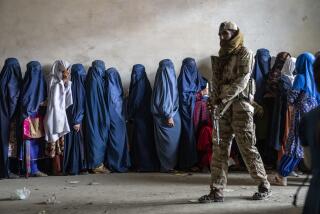The Spirit of Nairobi
Thousands of women have gathered in Nairobi to assess progress at the close of the United Nations Decade for Women. They are attending a forum called to talk about women’s attempts to achieve equality, development and peace in a world largely run by the other half of the population. It is a world in which the reality for women is often grim.
Twelve-thousand women from about 130 countries attended 1,000 workshops at the meeting, and it is difficult to tell precisely what they want--difficult in part because for most of their lives many have wanted only what men want. But the issues are legion: equality on the job, the effects of war on women and children, dowry demands, sexual slavery, apartheid, the critical role of women as food producers, the status of women in legal codes, political representation, health care, family planning, access to education. What is paramount to one woman is peripheral to another. An important achievement would be wider recognition of that simple point.
The conference has already achieved one goal: focusing attention on the plight and yet strength of women in Africa. Over the horizon from the busy meeting halls of Nairobi and out across the continent are women who produce 60% to 80% of Africa’s food. Their birthrates are the highest in the world. In a land steeped in tradition, they are subject to their husbands’ demands, and often have little access to the most basic birth-control information. Gains have been made in education, jobs and rural organizing in Kenya, for example, but the women will leave Nairobi with a new understanding of how much remains to be done.
The official session with government delegations will end Friday. One school of thought at the conference holds that the meeting should focus on areas that clearly affect women--such as family planning, agricultural development in the Third World or job equality. Another contends that, just as American feminists believe that “the personal is political,” so the reverse is true. Politics has constant fallout on women, whether it means sending their children to war or denying a country vital land reform because that would challenge the entire power structure. Because of the fractious nature of today’s world, both schools of thought are insisting on being heard.
For the moment, the forum’s success or failure will be measured by agreements on lofty principles or walkouts over political issues. In the long run the measure will lie in the strength of the ties that it created to bind together women working for their own betterment.
The important thing is that the United Nations has organized these forums--first in Mexico City in 1975, then in Copenhagen in 1980, and now in Nairobi. Something that can never come across in news accounts of such meetings is the intensity of feelings, the connections made, the motivation to return home to change one’s own corner of the world. Despite some old political arguments and new ones sure to come, the conference is rekindling that kind of spirit and expanding the numbers of women in positions to act on it.
More to Read
Sign up for Essential California
The most important California stories and recommendations in your inbox every morning.
You may occasionally receive promotional content from the Los Angeles Times.










